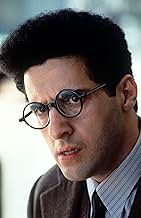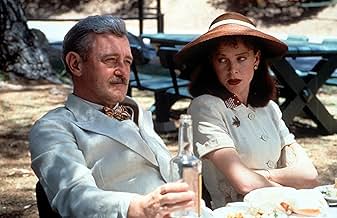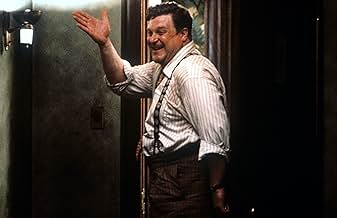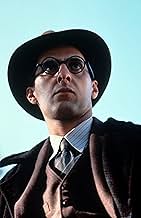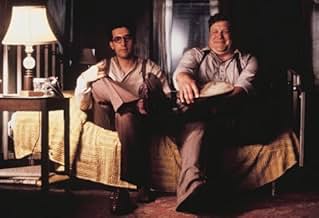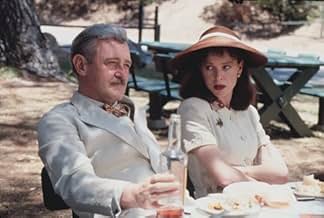Un famoso dramaturgo neoyorquino se ve tentado a trasladarse a California para escribir guiones de películas y allí descubre la realidad infernal de Hollywood.Un famoso dramaturgo neoyorquino se ve tentado a trasladarse a California para escribir guiones de películas y allí descubre la realidad infernal de Hollywood.Un famoso dramaturgo neoyorquino se ve tentado a trasladarse a California para escribir guiones de películas y allí descubre la realidad infernal de Hollywood.
- Nominado a 3 premios Óscar
- 19 premios ganados y 29 nominaciones en total
Meagen Fay
- Poppy Carnahan
- (as Megan Faye)
- Dirección
- Guionistas
- Todo el elenco y el equipo
- Producción, taquilla y más en IMDbPro
Opiniones destacadas
I am absolutely amazed at the fantastic taste of the imdb readership, having loved this film for years and always been told by people I'd told about it and persuaded to watch that it was no good, I finally find some other people out there who love it as much as me, posting (mostly) extremely positive comments...This is a fabulous film, dripping with a brooding, sticky atmosphere that draws you in to the clammy world of Barton Fink, sat in his hotel room listening to the creaking of the wallpaper as it dribbles moistly from the walls, searching for inspiration in his tacky painting and dusty typewriter...Perhaps it is a little dark for some tastes, but as black comedy goes this is the blackest and the most biting there is, the Hollywood system and New York theatrical snobbery lampooned with equal viciousness. Deep insight into the nature of the creative spirit, a plethora of fine performances bringing at first stereotypical characters to full life (despite the unreal, fable-like atmosphere created by the slimy, glistening colours reminiscent of the films of Jeunet&Caro...), and many moments of hilarity make this a perfect movie, one I would not hesitate in recommending to anyone despite the fairly high probability they will hate it. A lack of any underlying morality, an absence of absolutes of right and wrong, good and bad, give this film a unique feeling that it could go anywhere. The last twenty minutes are about the most powerful I have ever seen in anything, at the end of almost every scene I thought it could end there and be an amazing film, yet each further scene only added further depth and poignancy. The first time I saw it, it left me drained, mind spinning, hands shaking, barely able to reach for the remote to rewind it to watch it again...
The Coen brothers have come a long way from their start with an 8mm camera. They have written and produced some great homages to the film noir era of Hollywood, and this film is no exception.
First, is the great dialog written by the brothers. Great dialog is a feature of their films, and this one has some of the most memorable I have heard. You can almost turn off the visual and just listen and be enchanted and know you are listening to a Coen brothers film.
But turning off the visual would deprive you of the great cinematography of Roger Deakins. His can frame a scene to the point that you could pause the film and just soak in the texture and color and realism. It is almost as if every frame is a painting.
The Coen brothers also seem to get the best performances out of an actor that I have seen. John Goodman is brilliant in this film and he seems to do his best work for the Coens. John Turturro is captivating as the hack writer who talks about his love for the common man, but just really doesn't know the common man and really doesn't care about them. Michael Lerner was brilliant as the requisite man behind the desk that is the feature of 40's noir.
One doesn't always know what is in the Coen brothers minds. Is this a foretelling of the rise of Nazism, of intellectuals who really didn't understand the appeal of fascism to the common man, or a surreal portrait of someone who sells out. No matter what their intention, they make you think and return to see their films again and again.
First, is the great dialog written by the brothers. Great dialog is a feature of their films, and this one has some of the most memorable I have heard. You can almost turn off the visual and just listen and be enchanted and know you are listening to a Coen brothers film.
But turning off the visual would deprive you of the great cinematography of Roger Deakins. His can frame a scene to the point that you could pause the film and just soak in the texture and color and realism. It is almost as if every frame is a painting.
The Coen brothers also seem to get the best performances out of an actor that I have seen. John Goodman is brilliant in this film and he seems to do his best work for the Coens. John Turturro is captivating as the hack writer who talks about his love for the common man, but just really doesn't know the common man and really doesn't care about them. Michael Lerner was brilliant as the requisite man behind the desk that is the feature of 40's noir.
One doesn't always know what is in the Coen brothers minds. Is this a foretelling of the rise of Nazism, of intellectuals who really didn't understand the appeal of fascism to the common man, or a surreal portrait of someone who sells out. No matter what their intention, they make you think and return to see their films again and again.
While many of us know "Fargo" and "Big Lebowski", many fans still haven't heard of "Barton Fink", which is too bad. This is probably John Turturro's best role (and his least weird). Tony Shalhoub also gives an outstanding performance (at least as good as he was in "The Siege").
John Goodman? Heck, even he is pretty good here and I'm not a big fan of his (though the Coen Brothers do him justice like no others can). His portrayal of the questionable neighbor just really suits him.
There is supposed to be deep symbolism in this film -- some say it's an allegory for the rise of Nazism (and I can see that), while others say it's just a critique of Hollywood. I don't know. But, you know what? No matter what it's about, it's beautiful in a nihilistic way... and you will want to know: what's in the box? And I'm not going to tell you.
John Goodman? Heck, even he is pretty good here and I'm not a big fan of his (though the Coen Brothers do him justice like no others can). His portrayal of the questionable neighbor just really suits him.
There is supposed to be deep symbolism in this film -- some say it's an allegory for the rise of Nazism (and I can see that), while others say it's just a critique of Hollywood. I don't know. But, you know what? No matter what it's about, it's beautiful in a nihilistic way... and you will want to know: what's in the box? And I'm not going to tell you.
Re-watching this after I guess decades?
I enjoyed it but not overwhelmingly so. I think less than when i originally watched.
However I am reading, with amusement, the other reviews on here. They go on and on about how the movie skewers Hollywood and New York elites. No it doesn't. Instead this movie is dead simple: a playwright who says he is for the common man (and I mean man) is not really so. He is more interested in being seen as the great artist.
How do we see this?
He comes out to Hollywood and goes on and on in front of John Goodman about how he is for he common man while ignoring what Goodman had to say. Goodman repeated three times how he had stories to tell and Fink just ignored him.
Fink is more interested in himself as the great writer than actually focusing on the ask: write a wrestling movie, don't overthink it, write something similar to what others have done.
How do we see this? He insists on staying in a fleabag hotel as a sort of hairshirt to goose his artistic suffering and therefore creativity. But he doesn't need that creativity as he has been asked to write a straightforward wrestling movie in the style of past movies.
He could have stayed in a fancy hotel, enjoyed the lifestyle and written the wrestling movie.
Oh and those Hollywood elites? What the same ones who want to put out a wrestling movie that the public loves. Some elites huh!
I enjoyed it but not overwhelmingly so. I think less than when i originally watched.
However I am reading, with amusement, the other reviews on here. They go on and on about how the movie skewers Hollywood and New York elites. No it doesn't. Instead this movie is dead simple: a playwright who says he is for the common man (and I mean man) is not really so. He is more interested in being seen as the great artist.
How do we see this?
He comes out to Hollywood and goes on and on in front of John Goodman about how he is for he common man while ignoring what Goodman had to say. Goodman repeated three times how he had stories to tell and Fink just ignored him.
Fink is more interested in himself as the great writer than actually focusing on the ask: write a wrestling movie, don't overthink it, write something similar to what others have done.
How do we see this? He insists on staying in a fleabag hotel as a sort of hairshirt to goose his artistic suffering and therefore creativity. But he doesn't need that creativity as he has been asked to write a straightforward wrestling movie in the style of past movies.
He could have stayed in a fancy hotel, enjoyed the lifestyle and written the wrestling movie.
Oh and those Hollywood elites? What the same ones who want to put out a wrestling movie that the public loves. Some elites huh!
I'm still not entirely sure what to think of this film. One thing is sure, it won't be easy to forget. This movie is clearly the product of a writer who has struggled with their muse, and equally one who has a healthy mistrust of Hollywood - the sausage grinder. Although Hollywood has been critiqued in film before in similar ways, memorable scenes, clever dialogue, quality acting, and a surreal plot and setting, add together to make this an unusual and different film. Maybe another viewing might add a different dimension. This is by no means 'light entertainment' and it leaves plenty of questions unanswered. But on the whole, an intelligent movie, if something of an enigma. My vote 7/10
¿Sabías que…?
- TriviaThe first film to win all three major awards (Palme D'or, Best Director, and Best Actor) at the Cannes Film Festival. Also, it was unanimously chosen for the Palme D'or.
- ErroresBriefly visible at the top of the screen when Detective Mastrionotti introduces himself to Barton.
- Citas
Charlie Meadows: Look upon me! I'll show you the life of the mind!
- Créditos curiososThe 20th Century Fox logo appears over silence; the "fanfare" is not played.
- ConexionesEdited into The Clock (2010)
- Bandas sonorasFor Sentimental Reasons
by Edward Heyman, Al Sherman and Abner Silver
Licenced with Permission the Successors of Marlo Music Corporation (ASCAP)
Selecciones populares
Inicia sesión para calificar y agrega a la lista de videos para obtener recomendaciones personalizadas
- How long is Barton Fink?Con tecnología de Alexa
Detalles
- Fecha de lanzamiento
- Países de origen
- Idioma
- También se conoce como
- Бартон Фінк
- Locaciones de filmación
- Productoras
- Ver más créditos de la compañía en IMDbPro
Taquilla
- Presupuesto
- USD 9,000,000 (estimado)
- Total en EE. UU. y Canadá
- USD 6,153,939
- Fin de semana de estreno en EE. UU. y Canadá
- USD 268,561
- 25 ago 1991
- Total a nivel mundial
- USD 6,154,231
- Tiempo de ejecución1 hora 56 minutos
- Color
- Mezcla de sonido
- Relación de aspecto
- 1.85 : 1
Contribuir a esta página
Sugiere una edición o agrega el contenido que falta





